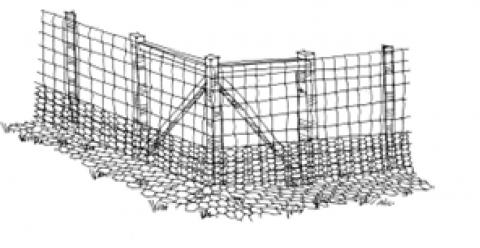Find help...
How to keep otters out of my pond in Rhode Island | River Otter
Rhode Island > Animal isn't actually causing a problem, but its presence is causing me concern > River Otter
How to keep otters out of my pond

Where otters seem intent on entering from underneath the fence, include a wire apron on the animal side of the fence.
Eliminate access to feeding sites and other areas. This can be accomplished with fencing, which may be expensive or impractical depending on the size of the pond. A sturdy, 4-foot-high fence constructed with 3-inch wire mesh is sufficient. Bury the bottom edge 6 inches in the ground or use a wire apron on the outside of the fence to keep otters from going underneath the fence.
Alternatively, when practical, a properly maintained high tensile electric fence can be effective. At least four strands, placed at 4- to 5-inch intervals, should be kept tight and clear of any weeds that could ground the charge. The bottom wire should be low to the ground and the spacing of the wires should be close enough so that otters can’t get under or through without getting shocked.
River otters will occasionally den in the inflow or outflow pipes of a pond. Seal the ends with fencing or flap gates that allow water to continue to flow through while excluding the otters.
Adapted from “Living with Wildlife in the Pacific Northwest” (see http://wdfw.wa.gov/wlm/living.htm) Written by: Russell Link, Wildlife Biologist, Design and layout: Peggy Ushakoff, ITAS2 Illustrations: As credited Copyright 2005 by the Washington Department of Fish and Wildlife
Laws and regulations to be aware of
While we attempt to provide guidance about state and federal regulations pertaining to specific species and control techniques, we do not provide information about local jurisdictions (city, town, county, etc.) where regulations may be more restrictive, especially as it applies to discharge of firearms, transport of animals or use of trapping equipment. Contact your local city or county government to inquire further. No guarantee is made that information (or lack of information) associated with a species or control technique is completely accurate or current. You should become familiar with federal, state and local laws before beginning any wildlife control activities. |
More solutions for river otter problems
